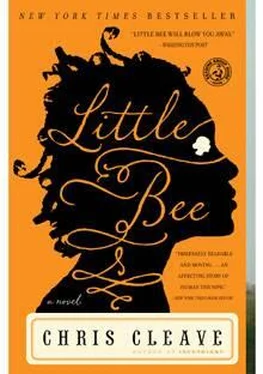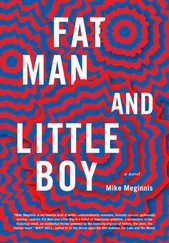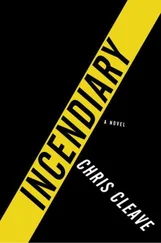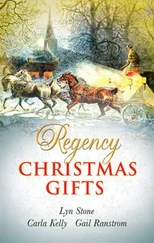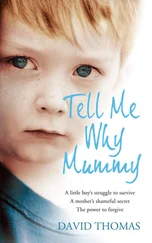I stayed there on the bank of the river and I stared and stared at these marvels. The sun shone out of the bright blue sky. It was warm, and a soft breeze blew along the bank of the river. I whispered to my sister Nkiruka, because it seemed to me that she was there in the flowing of the river and the blowing of the breeze.
“Look at this place, sister. We are going to be all right here. There will be room for two girls like us in a country as fine as this. We are not going to suffer anymore.”
I smiled, and I walked away down the embankment of the river, in the direction of the west. I knew that if I followed along the bank, I would get to Kingston -that is why they call it Kingston-upon-Thames. I wanted to get there as quick as I could, because now the crowds in London were starting to frighten me. In my village we never saw more than fifty people in one place. If you ever saw more than that, it meant that you had died and gone to the city of the spirits. That is where the dead go, to a city, to live together in their thousands because they do not need the space to grow their fields of cassava. When you are dead you are not hungry for cassava, only for company.
A million people were all around me. Their faces hurried past. I looked and looked. I never saw the faces of my family but when you have lost everyone, you never lose the habit of looking. My sister, my mother, my father and my uncle. Every face I see, I am looking for them in it. If I did meet you then the first thing you would have noticed would have been my eyes staring at your face, as if they were trying to see someone else in you, as if they were desperate to make you into a ghost. If we did meet, I hope you did not take this personally.
I hurried along the river embankment, through the crowds, through my memories, through this city of the dead. Once, beside a tall stone needle engraved with strange symbols, my legs burned and I needed to rest, so I stood still for a moment and the dead flowed around me, like the muddy brown Thames flowing around the pillar of a bridge.
If I was telling this story to the girls from back home, I would have to explain to them how it was possible to be drowning in a river of people and also to feel so very, very alone. But truly, I do not think I would have the words.
EARLY ON THE MORNING of Andrew’s funeral, before Little Bee arrived, I remember looking down from the bedroom window of our house in Kingston-upon-Thames. Out by the pond, Batman was poking at baddies with a plastic junior golf club, looking skinny and forlorn. I wondered if I should warm up some milk and make him a cup of something. I remember wondering if there was anything that could be put into a cup that would actually be of practical help. My mind was set in that crystalline, self-conscious state that comes with lack of sleep.
Beyond our garden I could see the whole street’s back gardens, curving away like a bent green spine, with barbecues and faded plastic swings for vertebrae. Through the double glazing came the braying of a car alarm and the drone of planes climbing out of Heathrow. I pressed my nose against the glass and I thought: these bloody suburbs are purgatory. How did we all wash up here? How did so many of us end up so very far downwind?
In the garden next door, on that morning of the funeral, my neighbor was hanging out his blue Y-fronts to dry. His cat was curling around his legs. In my bedroom the Today Programme was on the radio. John Humphrys said the FTSE was rather badly down.
Yes, but I have lost my husband. I said it out loud, while a trapped fly flew feebly at the windowpane. I said: My husband is dead, I’m afraid. My husband, Andrew O’Rourke, the celebrated columnist, has taken his own life. And I feel…
Actually I didn’t know how I felt. We don’t have a grown-up language for grief. Daytime shows do it much better. I knew I ought to feel devastated, of course. My life had fallen apart. Isn’t that the phrase? But Andrew had been dead nearly a whole week now and here I still was, dry-eyed, with the whole house reeking of gin and lilies. Still trying to feel appropriately sad. Still drilling down through the memories of my short, mixed life with poor Andrew. Searching for the capstone, the memory which when cracked would release some symptom of anguish. Tears, perhaps, under unbelievable pressure. All of this would have been easier on daytime TV: My life entered a vicious downhill spiral, Trisha. I couldn’t imagine getting through the day without him.
It was exhausting, prospecting for grief like this, unsure if grief was even there to be found. Perhaps it was just too soon. For the moment I felt more pity for a trapped fly that buzzed against the window. I opened the latch and out it flew, vulnerable and weak, back in the game.
On the other side of the glass, the day smelled of summer. My neighbor had shuffled along his washing line, three feet to the left. He’d finished pegging Y-fronts. Now he was on to socks. His washing hung like prayer flags, petitioning daytime gods: I seem to have moved to the suburbs, I’m afraid. Can anything be done?
A thought of escape presented itself, rascalish and unannounced. I could simply leave, right now, couldn’t I? I could take Charlie, my credit card and my favorite pink shoes and we could all get on a plane together. The house and the job and the grief would all shrink to a point behind me. I remember realizing, with a guilty thrill, that there was no longer one single reason for me to be here-far from the center of my heart, cast away here in its suburbs.
But life is not inclined to let any of us escape. That was the moment I heard a knock at the door. I opened the door to Little Bee, and for the longest time I simply stared at her. Neither of us spoke. After a few moments I let her in and I sat her down on the sofa. Black girl in a red-and-white Hawaiian shirt, stained by the Surrey clay. Sofa from Habitat. Memories from hell.
– I don’t know what to say. I thought you must be dead.
– I am not dead, Sarah. Maybe it would be better if I was.
– Don’t say that. You look very tired. You need some rest, I should think.
There was a silence that went on too long.
– Yes. You are right. I need some rest.
– How on earth did you…I mean, how did you survive? How did you get here?
– I walked.
– From Nigeria?
– Please. I am very tired.
– Oh. Yes. Of course. Yes. Would you like a cup of, you know…
I didn’t wait for the answer. I fled. I left Little Bee sitting on the sofa, propped up on the John Lewis cushions, and I ran upstairs. I closed my eyes and rolled my forehead against the cool glass of the bedroom window. I dialed someone. A friend. More than a friend, actually. That’s what Lawrence was.
“What is it?” said Lawrence.
“You sound cross.”
“Oh. Sarah. It’s you. God I’m sorry. I thought you were the nanny. She’s late. And the baby’s just been sick on my tie. Shit.”
“Something’s happened, Lawrence.”
“What?”
“Someone’s turned up I really wasn’t expecting.”
“Funerals are always like that. All the old skeletons come theatrically out of their closets. You can’t keep the bastards away.”
“Yes of course, but this is more than that. It’s, it’s…”
I stammered away and fell silent.
“Sorry Sarah, I know this sounds awful, but I’m in a terrible rush here. Is it something I can actually help with?”
I pressed my flushed face against the cold glass. “Sorry. I’m a bit confused.”
“It’s the funeral. You’re going to feel a bit scatty, aren’t you? I’m sorry, but there’s no way around that. I wish you’d let me come. How are you feeling about it all?”
Читать дальше
